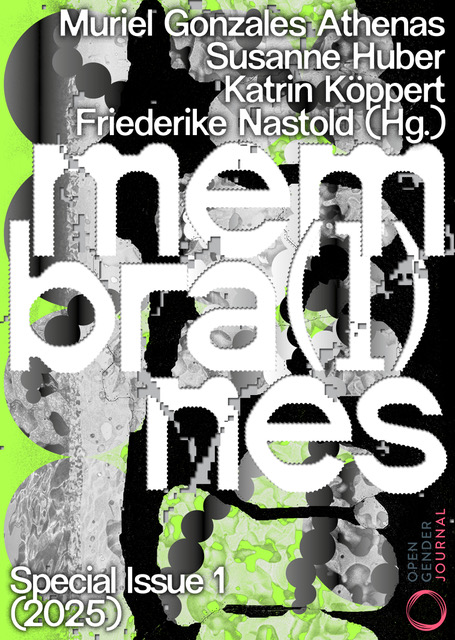Score for a Reader: Ši, Book of Entities
DOI:
https://doi.org/10.17169/ogj.2025.298Keywords:
Language, HñähñúAbstract
Reading as a dynamic act resists contracting into the path of linear writing. In “Ši, Book of Entities”, different elements of reality create the unimaginable, each universe that materializes sometimes just to simply disappear – like the growth of a mushroom or the memory of childhood – constituting the multiplicity and polyphony of the living, shaped by its interdependencies. The book of entities is a book-organism fungi, its codes are inaccessible to human perception, the relationship that is established is affective as human and ‘other’ mutually modify each other. In an in-between of scientific and artistic research, the words of this text that can be read as arguments are interrupted by letters, phonemes, and QR codes. Through interruptions by sonorities such as tik, ši, or jo, categories of autonomy and equality are fissured, creating hybrid corporealities that reach beyond humanist understanding of time, space, and language.
References
Borges, Jorge Luis (1979): El Libro, Borges Todo el Año. https://borgestodoelanio.blogspot.com/2018/02/jorge-luis-borges-el-libro.html (19.05.2025)
Casanovas, Arges Pérez (2024): Derribar el Mito de la Autonomía. Hacia una Filosofía de la Interdependencia. https:/www.youtube.com/watch?v=9YCfkdn6E4I (21.05.2025)
Castillo, Felipe Canuto (2020): Yá nthogi ya jä’itho nsantyago nt’ähi, maxei. Stories of the Otomi of Santiago Mexquititlán, Querétaro. Mexico: Universidad de Guanajuato.
Ceriani, Alejandra Cristina (2021): Bioperformance [Inclusiva]: Sobre las Corporalidades, lo Performático y lo Postdisciplinar. In: Polyphōnia. Revista de Educación Inclusiva 5 (1), 80–101.
Clark, Lygia (2019): Untitled Bugs Series. https://www.mssa.cl/obras/sin-titulo-serie-bichos/ (21.05.2025).
Derrida, Jacques/Wills, David (1995): The Gift of Death. Chicago, London: The University of Chicago Press.
Galinier, Jacques (1990): La Mitad del Mundo. Cuerpo y Cosmos en los Rituales Otomíes, Mexico City: Centro de Estudios Mexicanos y Centroamericanos. doi: 10.4000/books.cemca.2798
Giraldo, Omar Felipe/Toro, Ingrid (2020): Afectividad Ambiental. Sensibilidad, Empatía, Estéticas del Habitar. Campeche: El Colegio de la Frontera Sur y Universidad Veracruzana.
González Casanova, Pablo (2003): Colonialismo Interno (Una Redefinición). In: Revista Rebeldía 12, 1–30.
González, José Ramón (1998): La Estrategia del Fragmento ‘El Libro de los Abrazos’ de Eduardo Galeano. In: Castilla: Estudios de Literatura 23, 99–108.
Haraway Donna (2016): Staying with the Trouble. Making Kin in the Chthulucene, Durham, NC: Duke University Press. doi: 10.1215/9780822373780
Kirksey, Eben/Helmreich, Stefan (2024): El Surgimiento de la Etnografía Multiespecie. In: Revista Sarance 52, 10–42. doi: 10.51306/ioasarance.052.02
Lenkersdorf, Carlos (2010): B’omak’umal tojol’ab’al-kastiya 1. Diccionario Tojolabal-Español, Idioma Mayense de Chiapas. 3rd Edition. Mexico: Carlos Lenkersdorf.
Lindig Cisneros, Erika (2013): Genesis of Language in Humboldt. In: Acta poét 34 (2), 15–33. doi: 10.1016/S0185-3082(13)72401-5
Marín, César/Suárez, Javier (2024): Fungi Philosophy. In: Ludus Vitalis, Revista De Filosofía De Las Ciencias De La Vida 30 (2), 71–96. doi: 10.22370/lv.2024.30.2.4566
Nancy, Jean-Luc (2003): Corpus. Madrid: Arena Libros.
Pron, Patricio (2016): La Nota a Pie de Página. https://letraslibres.com/revista-espana/la-nota-a-pie-de-pagina/ (21.05.2025).
Rojo, Mayra Citlalli Gómez (2020): Notes for a Manifesto. Singular Creatures/Graft and Soil. In: Technoetic Arts 18 (2/3), 105–112. doi: 10.1386/tear_00030_1
Rojo, Mayra Citlalli Gómez (2019): Zombi, Zumbi, Zomibie. El Sonido de la Multitud. Utopía Revista de crítica cultural, 55–61.
Ribeiro, Darcy (1977): Las Américas y la Civilización. Proceso de Formación y Causas del Desarrollo Desigual de los Pueblos Americanos. Mexico City: Extemporáneos.
Rolnik, Suely (2021): El Híbrido de Lygia Clark. https://mundoperformance.net/2021/05/28/el-hibrido-de-lygia-clark/ (21.05.2025).
Rolnik, Suely/Gauttari, Félix (2005): Micropolítica: Cartografías del Deseo. Buenos Aires: Tinta Limón Ediciones.
Ruiz Herrera, José (2008): Viaje al asombroso mundo de los hongos. Mexico City: FCE.
Taussig, Michael (2011): I Swear I Saw This. Drawings in Fieldwork Notebooks, Namely My Own. Chicago: University of Chicago Press. doi: 10.7208/chicago/9780226789842.001.0001
Wall, Luis G. (2020): Historias del Inframundo Biológico: Más Bacterias, las Mismas Plantas, mi Exmujer, mi Novio, el Cocinero y más Amantes. Buenos Aires: Siglo Veintiuno.
Zárate, Eduardo (2023): The Other Voices of Decolonialism. Commentary to ‘Beyond Decoloniality. Discussion of some Key Concepts’ by David Lehmann. In: Revista Encartes 12, 59–68. doi: 10.29340/en.v6n12.335

Downloads
Published
How to Cite
Issue
Section
License
Copyright (c) 2025 Mayra Citlalli Rojo Gómez

This work is licensed under a Creative Commons Attribution 4.0 International License.
All contributions in Open Gender Journal are published under the Creative Commons Attribution 4.0 International license. You may freely make use of the corresponding texts in accordance to the conditions of the license (License contract, generally understandable version). There is no exclusive transfer of usage rights ("copyright transfer"). Open Gender Journal does not charge authors any costs for publication (so-called Article Processing Charges, APC) or submission (so-called Submission Charges). Authors are encouraged to share their contributions in other places, such as repositories.












